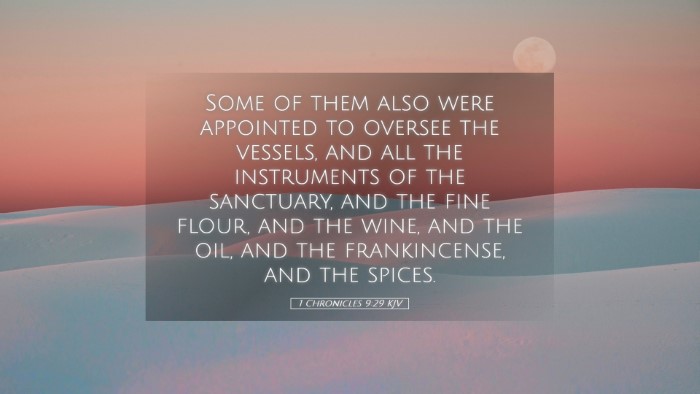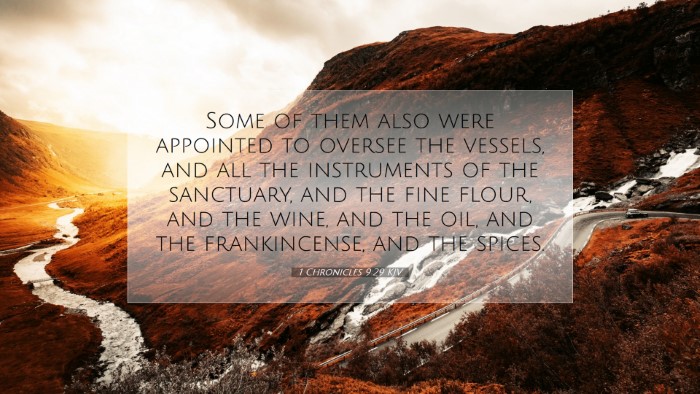Commentary on 1 Chronicles 9:29
Verse: 1 Chronicles 9:29
“And some of the sons of the priests made the ointment of the spices.”
Introduction
In 1 Chronicles 9:29, we encounter references to the duties of the priests and their unique roles in the temple, particularly concerning the preparation of sacred oils and incense. This verse serves as a pivotal reminder of the sacred responsibilities entrusted to the Levitical priesthood, underscoring a blend of heritage, duty, and divine order.
General Context
The context of 1 Chronicles emphasizes the restoration and significance of worship in post-exilic Israel. Chronicles often contrasts the ideal worship practices established by David and later kings against the historical shortcomings of the people. This verse encapsulates the continuity of these practices, symbolizing not only the refinement of spiritual activities but the identity of the Israelites as God’s chosen people.
Insights from Commentaries
Matthew Henry's Commentary
Matthew Henry emphasizes the service of the priests, noting that the preparation of the sacred ointment reflects a commitment to God's service. He observes that the priests not only performed duties related to sacrifices but also engaged in tasks that were perhaps deemed less glamorous, such as concocting the holy oils.
- Dedicated Stewardship: Henry points out that the priests’ involvement in preparing sacred elements illustrated their dedication to the temple’s holiness.
- Symbolism of the Ointment: He reflects on the rich symbolism of the spices, which could represent the sweet fragrance of devoted worship rising before God.
- Holiness in Daily Tasks: Henry teaches that even mundane tasks can contribute to the divine purpose when performed with the right heart and dedication.
Albert Barnes' Commentary
Albert Barnes provides a practical view of the verse, analyzing the ritualistic aspects of the priests' actions. He asserts that the making of the ointment was not just a ceremonial duty; it reflected the organized structure of worship.
- Structure of Worship: Barnes highlights that the delineation of duties signifies the order that God imposed within His worship, ensuring that every aspect was handled with reverence.
- Role of Spices: He notes that the spices used were symbolic of richness and the need for a pleasing aroma in the sight of the Lord, underscoring the theological underpinning of these sacred preparations.
- Implications for Modern Worship: Barnes implies that contemporary worship must also invoke care and consideration akin to the meticulousness demonstrated by the priests.
Adam Clarke's Commentary
Adam Clarke approaches the verse with a focus on the significance of divine ordinance in the lives of the priests. He expounds on the specific spices and their origins, creating a backdrop of understanding regarding the importance of what they were doing.
- Divine Command: Clarke states that the making of the ointment was ordained by God, which implies a divine intention behind every aspect of worship.
- Historical Significance: He provides insights into the historical context, suggesting that these practices were a part of Israel’s identity and heritage.
- Spiritual Implications: Clarke encourages readers to view the preparation as a form of worship itself—each act holds significance in the light of glorifying God.
Theological Reflections
Collectively, these commentaries shed light on several theological implications inherent in 1 Chronicles 9:29:
- The Role of the Priesthood: The passage underscores the vital role of the priesthood in facilitating worship and maintaining holiness through dedicated service to God.
- Significance of Ritual: The making of sacred ointments exemplifies how God’s people were to engage in rituals that went beyond mere formality; these acts were imbued with meaning and purpose.
- Continuity of Worship: This verse highlights the continuity of Israel's worship practices, demonstrating the importance of adhering to divine guidelines throughout history.
Application for Today
The insights gleaned from this verse and the associated commentaries prompt several applications relevant to modern believers, pastors, students, and scholars:
- Commitment to Service: Just as the priests were committed to their tasks, believers today are called to serve in their communities and churches diligently and faithfully.
- Importance of Ritual and Order: The significance of rituals in worship should not be neglected; practices rooted in Scripture remain vital in connecting believers to God.
- Cultivating a Heart of Worship: Each task, regardless of how small, can be an act of worship if performed with a heart aligned with the purposes of God.
Conclusion
1 Chronicles 9:29 holds a deeper significance than what appears on the surface. The acts of the priests preparing the sacred ointment encapsulate themes of dedication, divine order, and the richness of worship. As believers continue to reflect on their own practices in light of this verse, they are encouraged to pursue reverent worship that aligns with biblical principles, recognizing that each act, regardless of its perceived magnitude, contributes to the greater tapestry of God’s work in the world.


